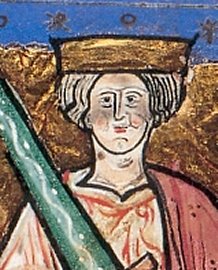Ethelred II of England
|
|
 Ethelred II pictured in the Chronicles of Abingdon | |
| Rank: | 15th |
| Ruled: | March 18, 978-December 25, 1013 and February 2, 1014-April 23, 1016 |
| Predecessor: | Edward the Martyr |
| Date of Birth: | 968 |
| Place of Birth: | Wessex |
| Wives: | Ælfgifu and Emma |
| Buried: | Old Saint Paul's Cathedral |
| Date of Death: | April 23, 1016 |
| Parents: | Edgar and Ælfthryth |
Ethelred II (Old English: Æþelred) (c. 968 – April 23, 1016), known as the Unready, was a King of England (978 - 1013 and 1014 - 1016).
According to William of Malmesbury, Ethelred defecated in the baptismal font as a child, which led St. Dunstan to prophesy that the English monarchy would be overthrown during Ethelred's reign. This story is, however, almost certainly a fabrication.
Ethelred succeeded to the throne aged about 10 following the death of his father King Edgar and subsequent murder of his half-brother Edward the Martyr. His nickname "The Unready" does not mean that he was ill-prepared, but derives from the Anglo-Saxon unræd meaning without counsel. This is also a pun on his name, Æþelræd, which means "Well advised".
Ethelred had at least sixteen children from two marriages, the first to Ælfgifu, the daughter of Thored, the ealdorman of Northumbria and the second, in 1002, to Emma of Normandy, whose grandnephew, William I of England, would later use this relationship as the basis of his claim on the throne.
England had experienced a long period of peace after the reconquest of the Danelaw in the first half of the 10th Century. However in 991 Ethelred was faced with a Viking fleet larger than any since Guthrum's "Summer Army" a century earlier. This fleet was led by Olaf Trygvasson, a Norwegian with ambitions to reclaim his country from under Danish domination. After initial military setbacks including the defeat of his Ealdorman Birhtnoth at the Battle of Maldon, Ethelred was able to come to terms with Olaf, who returned to Norway to gain his kingdom with mixed success. While this arrangement won him some respite England faced further depredations from Viking raids. Ethelred fought these off, but in many cases followed the practice of earlier kings including Alfred the Great in buying them off by payment of what was to become known as Danegeld.
Ethelred ordered the massacre of the Danes living in England on St Brice's Day (November 13) 1002, in response to which Sweyn Haraldsson started a series of determined campaigns to conquer England. In this he succeeded, but after his victory, he only lived for another five weeks.
In 1013, Ethelred fled to Normandy, seeking protection by his brother-in-law, Robert of Normandy, when England was over-run by Sweyn Haraldsson of Denmark and his forces. He returned in February, 1014, following the death of Sweyn Haraldsson. Ethelred died on April 23, 1016, in London, where he was buried. He was succeeded by his son, Edmund II of England.
Despite the steady stream of viking attacks, Ethelred's reign was far from the disaster described by chroniclers writing well after the event. Ethelred introduced major reforms of the machinery of government in Anglo-Saxon England, and is responsible for the introduction of Shire Reeves or Sheriffs. The quality of the coinage, always a good indicator of the prevailing economic conditions, remained very high during his reign.
References
- Ann Williams: Æthelred the Unready : The Ill-Counselled King. London : Hambledon Press, 2003. ISBN 1852853824
